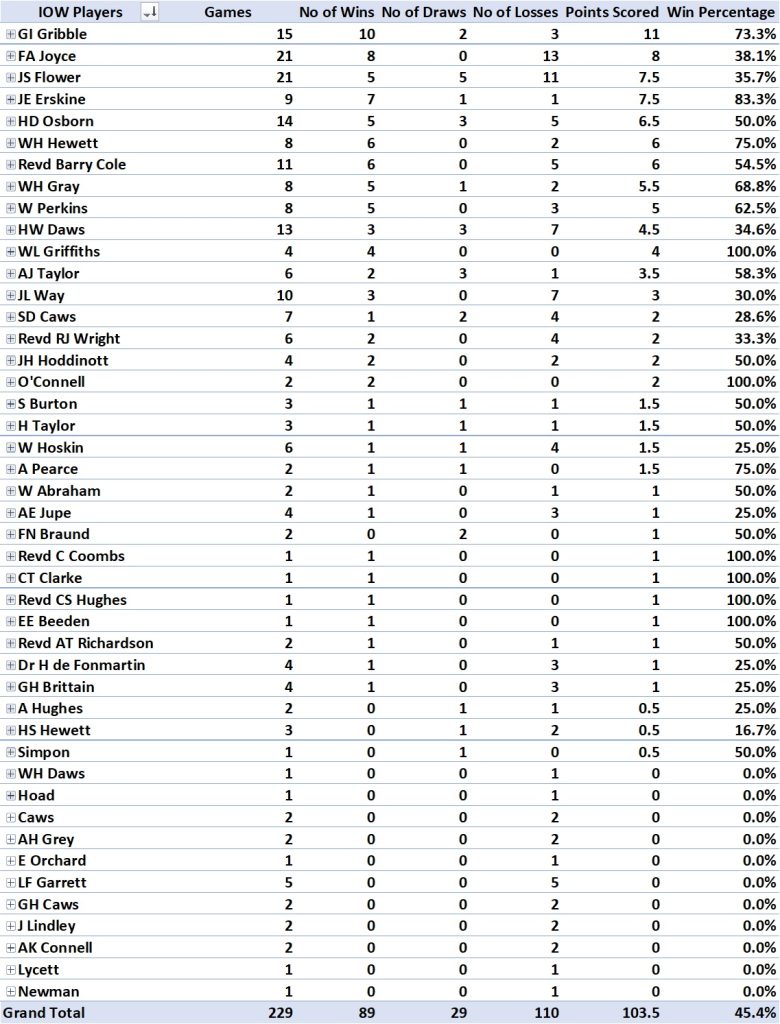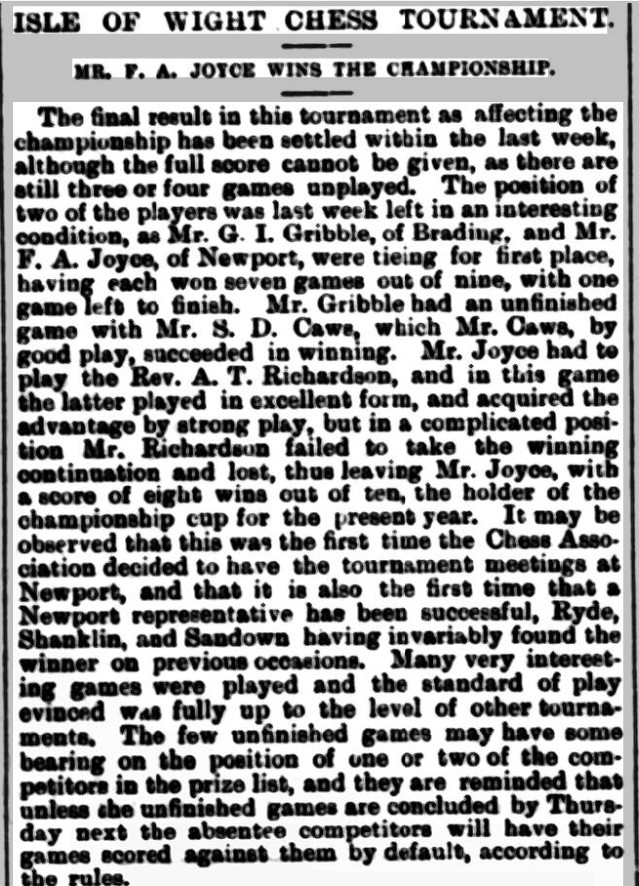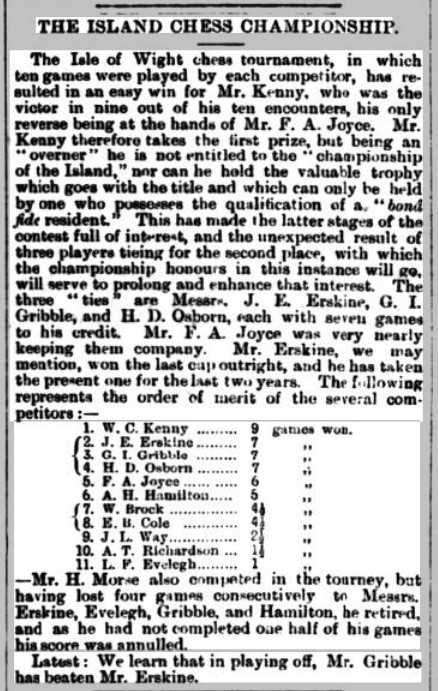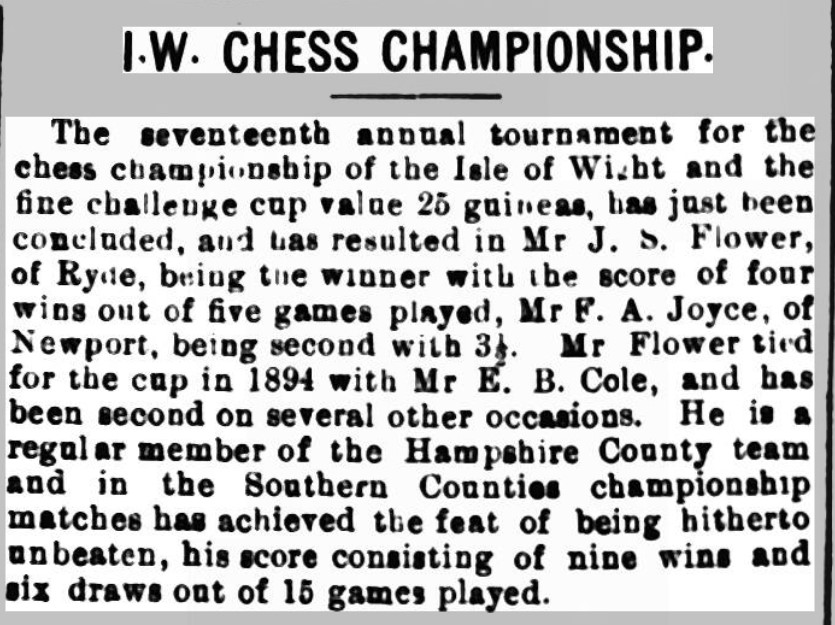Isle of Wight – Early Chess Matches – Part Four
The final post on the Isle of Wight Chess will provide rough analysis of the Isle of Wight early Chess county matches against Portsmouth, Southampton and Norfolk Chess Associations / Clubs. In addition I will touch on a couple of the players who played the most.
Matches Played
As stated in previous posts I know this will not be all the matches played by the Isle of Wight in their first 21 years. It should give an indication of their strength, regular players and success factor against the three Chess Associations / Chess Clubs who they played against. I have also excluded the Isle of Wight vs Ryde match, as this was more of an internal IOW contest.
The Isle of Wight played 13 matches with 4 wins and 13 losses. Their 17 – 2 win against Portsmouth was the stand out result, after which I am sure Portsmouth ensured their team were selected from the Portsmouth Association, rather than just the Portsmouth club. Southampton Chess club proved too hard an opponent, but the matches were always competitive and Southampton were a very strong club.
IOW Chess Matches
| Cycle | Date | Location | Team Score | Opponent Score | Opponent | Result |
| 1888-89 | 15/08/1888 | Cowes | 9 | 15 | Southampton Chess Club | Loss |
| 1888-89 | 26/09/1888 | Cowes | 9 | 15 | Southampton Chess Club | Loss |
| 1889-90 | 17/04/1890 | Ryde | 13 | 11 | Portsmouth Chess Club | Win |
| 1890-91 | 02/10/1890 | Ryde | 7 | 13 | Portsmouth Chess Club | Loss |
| 1891-92 | 08/07/1891 | Sandown | 17 | 2 | Portsmouth Chess Club | Win |
| 1891-92 | 29/7/1891 | Cowes | 8 | 12 | Southampton Chess Club | Loss |
| 1892-93 | 14/9/1892 | Cowes | 6 | 13 | Southampton Chess Club | Loss |
| 1893-94 | 30/8/1894 | Cowes | 6 | 9 | Southampton Chess Club | Loss |
| 1897-98 | 13/1/1898 | Telephone | 3 | 5 | Norfolk | Loss |
| 1897-98 | 29/7/1897 | Cowes | 7.5 | 14.5 | Southampton Chess Club | Loss |
| 1899-00 | 13/09/1899 | Ryde | 3.5 | 8.5 | Portsmouth Chess Club | Loss |
| 1904-05 | 09/06/1904 | Ryde | 8.5 | 3.5 | Portsmouth Chess Club | Win |
| 1908-09 | 18/02/1909 | Telephone | 6 | 3 | Norfolk | Win |
As to the players seven played more than ten games although in some of the early matches players would have played two games and in the latter matches they would just have played the one game. Full details of the players, their wins, draws, losses, points scored and win percentage is below.
Individual Players
I have looked at some of the players, mainly concentrating on the ones who played the most games.
GI Gribble

In part two I touched on the dispute between GI Gribble and SD Caws. But in-between disputes Mr Gribble had 10 wins (1 by default), 2 draws and only 3 losses in his games. for the Isle of Wight. This included a draw against the very strong Frank Elwell of Southampton Chess Club.
In a lot of the early games in 1890 and the start of 1891 Mr Gribble was playing on the low boards, but was soon playing on the higher boards. His name is often mentioned as a participant in the annual Isle of Wight Chess Championship and he managed to win this in 1893. He was also a key part of the organisation, as in 1898 he was the Hon. Secretary. He also played 8 times for Hampshire from 1893 to 1921, winning twice, drawing once and losing five times.
All in all Mr Gribble had a fantastic record in his matches and as well as drawing with Frank Elwell he beat Hampshire County regular DHH Wassell (22 games for Hampshire).
His losses were to strong Hampshire players A Asher (29 games, avg bd 6) and Chipperfield (18 games).
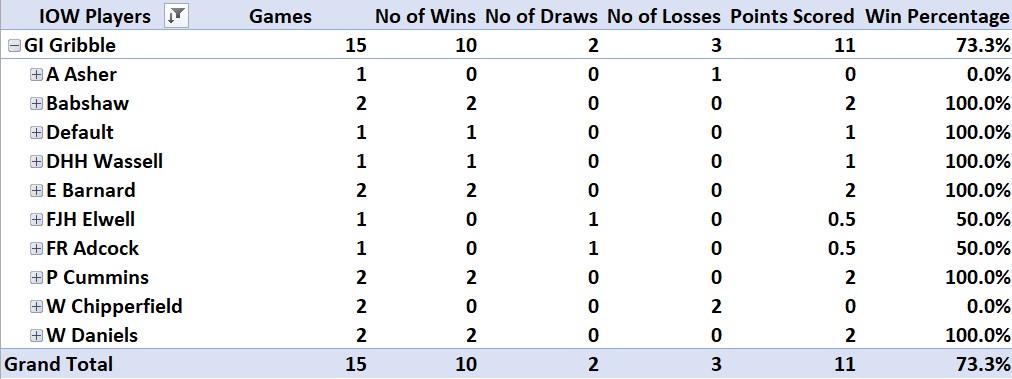
FA Joyce

Jointly playing the most games (21) Frank Joyce was also a prolific Hampshire player 62 games with just under a 50% score. For the Isle of Wight Frank was often playing on the top boards where he faced strong opposition. Therefore his 38% record which was from 8 wins and 13 losses (no draws!) was not a surprise. But digging a bit further this was actually a 60% record against Portsmouth and a 18% against Southampton (50% against Norfolk).
Playing the top boards against Southampton Chess club was a tough task and his opponents included players who were playing on or near the top boards for Hampshire.
Frank Joyce did win the Isle of Wight Chess Championship in 1898 as detailed in the Isle of Wight County Press and South of England Reporter. This was a very close tournament, just finishing ahead of Mr Gribble with his last round win and Mr Gribble’s loss.
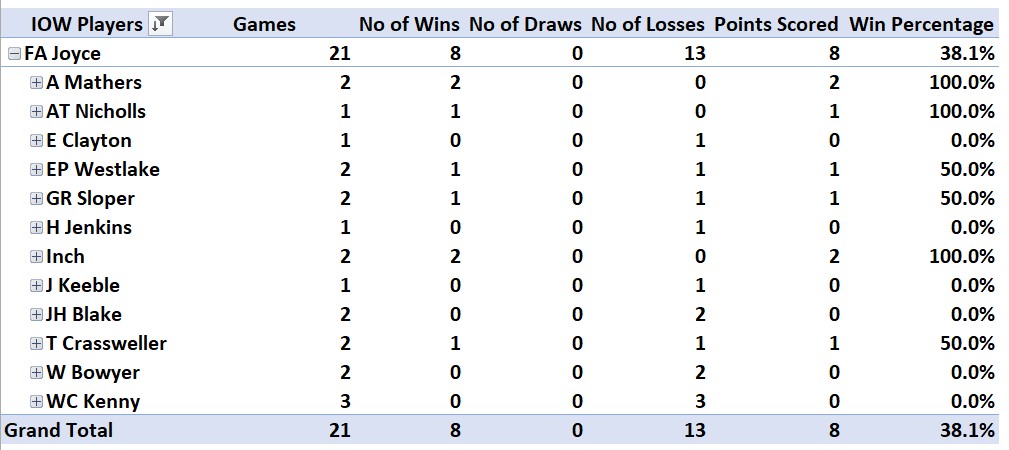
JE Erskine

Only playing 9 times for the Isle of Wight JE Erskine had probably the best performance of any player with only 1 loss and 1 draw from his games. He played board one in four of his games, board four in two, and board six in his other three games. His only loss was against Joseph Blake in the September 1888 match (see part one) who he also beat in the same match.
His other results included beating E Clayton twice (played 56 times for Hampshire with a 43% record). Three wins and a draw against W Brock (played 6 times for Hampshire with 50% record).
Mr Erskine won the Isle of Wight championship a number of times. In the same way that non Hampshire players can play in the Hampshire Championship, but the winner of the trophy has to be a Hampshire player. This was also the case with the Isle of Wight where a “overner” could not win the valuable trophy (cost 25 guineas in the 1880’s which would be approx. £3,000). For example Southampton player WC Kenny won the tournament in 1893, but JE Erskine, GI Gribble and HD Osborne all tied for 2nd place. Gribble beat Erskine in the play-off and subsequent reporting stated he was a winner of the championship.
Back to Mr Erskine, he was not as prolific as some of the other Isle of Wight players outside of Island chess, only playing three times for Hampshire, but looks to be the Island’s best player from the mid 1880’s to 1890s’. Below is his match record from the Association games.

JS Flower

JS Flower jointly played the most games for the Isle of Wight scoring just under 36%. He was also the Chess correspondence for the Isle of Wight Observer covering this first telephone match against Norfolk.
He performed better in his early matches when he was on lower boards, but after 1892 when he was on the top five boards he only scored 1½ points from 10 games. He had a number of tough opponents in these games including:
- Sir GA Thomas (18 games for Hampshire scoring 75%, plus all his other achievements)
- A Asher (29 games for Hampshire, mainly on the top 10 boards)
- FJH Elwell (5 times Hampshire Individual champion, 101 games for Hampshire scoring 63%, mainly on top 2 boards)
But he did manage to beat Portsmouth A Wheatstone twice who scored almost 70% for Hampshire and drew twice against Asher from their four games. JS Flower also played 23 times for Hampshire scoring 57%. The majority of these games were on the top 10 boards, and he was therefore probably stronger than his results for the Isle of Wight would at first sight indicate.
An article in the Isle of Wight Times from March 1901 states that he won the Isle of Wight championship that year, after previously tying with Mr EB Cole and being second a number of times. This article also confirms his record for Hampshire as at this time with nine wins and six draws from his first fifteen games. My record actually states he had a loss in the Sussex match from 3rd November 1894, but nevertheless an impressive record.
Below is his match record from the Association games.
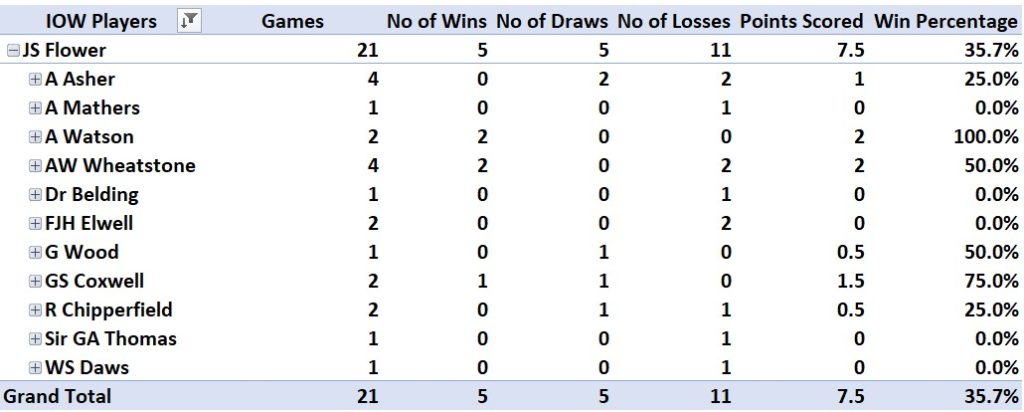
This brings and end to my articles on the early Isle of Wight chess county matches and some of the players and activities around this time. At a later date I may look into what happened in the 20th century. The Isle of Wight certainly played in the Hampshire League, but I think this was as Ryde rather than an Island team? They won Division Two in the 1925/1926 and 1973/1974 season.
Acknowledgements and sources:
- Eastern Evening News
- Isle of Wight Observer
- Isle of Wight County Press and South of England Reporter
- Isle of Wight Times
- The British Newspaper Archive

